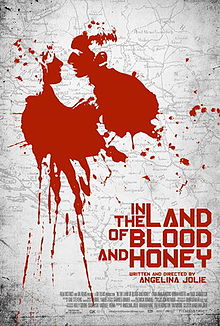 Angelina Jolie—Hollywood actress and ambassador for UNHCR, an agency that deals with refugees in the United Nations—directed her first movie; this movie set in Bosnia is a melodrama depicting the fates of two lovers—a commanding officer of the Serb army, and a Muslim and Bosniak woman—during the Bosnian War. I hear this movie will premier in Japan in 2013.
Angelina Jolie—Hollywood actress and ambassador for UNHCR, an agency that deals with refugees in the United Nations—directed her first movie; this movie set in Bosnia is a melodrama depicting the fates of two lovers—a commanding officer of the Serb army, and a Muslim and Bosniak woman—during the Bosnian War. I hear this movie will premier in Japan in 2013.
I personally like and admire actress Angelina Jolie because she always donates a lot of money to refugees or people suffering in natural disasters, and her contribution to the education of Middle Eastern women and promotion of foster parent organizations was courageous. However, I don’t have much admiration for this movie. I want to summarize my thoughts below.
First of all, English was used for this movie. This movie was largely distributed in America where people may find subtitles to be annoying. Although the actors in the movie all spoke English very well, I would’ve liked to hear Bosnian or Serbian spoken instead. I feel this reduces the authenticity of the movie.
 This movie is after all a Hollywood movie. As is expected, the actress playing the protagonist begins by wearing a skirt and sweater, but gradually more skin is exposed and when she is in the hideout of her lover, the Serb commanding officer, she is wearing a dress that looks like something Angelina Jolie would wear on the red carpet… What? Isn’t this character a Muslim woman? From where would she have procured such a stunning, Western-style dress? This actress also resembles Angelina Jolie in her appearance. The actors in this movie are instructed in the Hollywood way of expressing emotion, such as throwing something when angry.
This movie is after all a Hollywood movie. As is expected, the actress playing the protagonist begins by wearing a skirt and sweater, but gradually more skin is exposed and when she is in the hideout of her lover, the Serb commanding officer, she is wearing a dress that looks like something Angelina Jolie would wear on the red carpet… What? Isn’t this character a Muslim woman? From where would she have procured such a stunning, Western-style dress? This actress also resembles Angelina Jolie in her appearance. The actors in this movie are instructed in the Hollywood way of expressing emotion, such as throwing something when angry.
This movie portrays Serbs very one-dimensionally as scoundrels. The historical background setting up to the war is not described. One after another, cruel scenes are shown (such as the raping of a Bosniak by a Serb soldier, or a Serb soldier using a Bosniak woman as a human shield as he shoots at a Bosniak soldier). Bosniak soldiers are portrayed virtuously, but Serb soldiers are always portrayed as ugly and they laugh when they are killing their enemy. The Bosian War started because both the Bosniaks and the Serbs felt they were in danger, and both sides insisted that the other side started the war. However, this movie depicts the Serbs as the obvious bad guy. The cruel scenes serve as proof of this. I think the Hollywood movie method is to feed the audience a clear good guy and bad guy in a situation even though the conflict is very complicated.
Angelina Jolie visits countries all over the world as a goodwill ambassador. I think this movie was based on an impression she gained when she visited Bosnia-Herzegovina, and she wanted justice by conveying what she witnessed herself to the world. She was very shaken by the Serb army’s ethnic cleansing in the area of Bosniaks by not only murder, but systematic rape. Even though the Bosnian War was very complicated, it was very brave and difficult for her as a young foreigner to make this movie. When making this, she may have thought, “I don’t know anything about Bosnia, but because I know about love, I want to depict the Bosnian War with love as the main principal.” In short, this movie appears to be the story of a man and a woman who may have happily had a family if not for this war changing their fates.
However, is there true love between these two? Danijel, the Serb man, and Ajla, the Bosniak woman met just once before the war started and liked each other. Danijel doesn’t know what kind of person Ajla is or what she does. When the war begins, Ajla is taken with other Bosiak women by the Serb army and nearly raped, but the commanding officer of the soldiers that took the women is Danijel and he says to a soldier, “You’ve had enough fun,” and stops him from raping Ajla. Danijel is the son of the highest commanding officer of the Serb army. Danijel tells his subordinates that Ajla is his property and doesn’t let her get raped. On top of that, Danijel helps her escape. However, Ajla comes back to Danijel’s unit as a spy. She is given her own giant room and is brought food every day by Danijel. Danijel gets very angry and kills a subordinate when he discovers the soldier had raped Ajla under the orders of Danijel’s father; also, Danijel tells Ajla military secrets. When I watch Danijel, I get irritated and think, “Whatever the reason for war, why can’t you be responsible for your home country and your men?” In the end, Danijel discovers that Ajla is a spy; he then shoots her and surrenders himself to the UN troops by saying, “I am a war criminal.”
Although the Bosnian War looked like a civil war, the United Nations decided to intervene because the ongoing racial extermination was a crime against humanity. However, is it the best ending for Angelina Jolie to have Danijel declare himself a war criminal at the end? I wonder how the audience reacts to the one-sided blame on the Serbs in this movie. Not all Serbs are murderers and many were not aware of the massive killings being performed. Some short lines in the movie say not all Serbs are bad people, but this is lost among the endless images of brutality within this movie.
Also in this movie, Danijel’s father briefly tells the history of his time as a commissioned Serbian officer and the sad history of his nation, but he speaks in quite a monotone as if reading from a history textbook so his words regretfully do not stay in the audience’s heart.
The Balkan Peninsula was under Turkey’s control, but by the late 19th century, the Ottoman Empire declined and in 1875, the Russo-Turkish War began over this land between Turkey and Russia. After the war, through support from Great Britain who was uneasy about Russia’s policies going south, Austria strengthened their control over Bosnia and Herzegovina and in 1908, Bosnia and Herzegovina were incorporated into Austria. However, Serbia, neighboring Bosnia and Herzegovina, had the intention to expand as part of the Greater Serbia movement, and so opposed Austria for this land. This became the cause of World War I.
After World War I, because of Austria’s defeat, Serbia became the core of the Serb-Croat-Slav Empire in the Balkan Peninsula and absorbed Bosnia and Herzegovina. However, during World War II, Nazi Germany used Croatia as a puppet government to take over the Balkan Peninsula and Serbs were suppressed. By means of the Croatian nationalist organization Ustaše, Serbs were persecuted along with Jews and any anti-establishment groups, and were taken to concentration camps to be murdered. Faced with this, the Chetniks, a Serb nationalist organization, was formed and it stirred up an anti-Croatia movement.
After World War II, the Federal Republic of Yugoslavia was established in the Balkan Peninsula, their charismatic leader Tito able to form alliances between many ethnicities. During this time, there was little tension between ethnicities and in urban areas, many different ethnicities lived together and marriages tied them together. Yugoslavia was different from other satellite countries of the Soviet Union; movies criticizing the regime were not banned there, and in 1984 they hosted the Sarajevo Winter Olympics. But ethnic conflict resumed after the collapse of the Soviet Union when various countries within Yugoslavia declared independence in 1990. The Bosniaks and the Croatians living within the Bosnian region wanted to be independent from Yugoslavia, which was dominated by Serbs, while the Serbs in that region wanted to remain under Yugoslavia; this was the beginning of the Bosnian War. Later, a dispute between Croatians and Bosniaks started and began a three-way war.
In 1994, there was a military intervention by the United States of America and NATO; in 1995, the war ended after the signing of the Dayton Accords, the peace agreement mediated by the United Nations. In order for this movie to be accurate, Angelina Jolie was said to have asked for the details in the movie to be reviewed by Richard Holbrooke, the Assistant Secretary of State of Clinton’s administration who worked on the Dayton Accords; she also asked other diplomats involved in these negotiation efforts and reporters who covered the Bosnian War. Richard Holbrooke under Obama’s administration was appointed as the special envoy in charge settling the Afghanistan/Pakistan conflict, but in 2010, he became sick and died as a special envoy in office before the completion of this movie.
